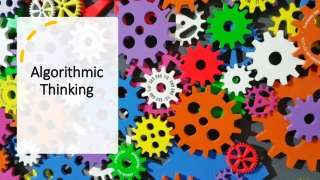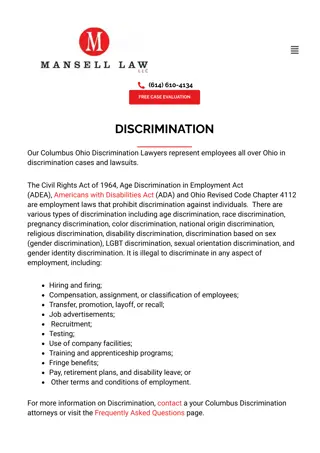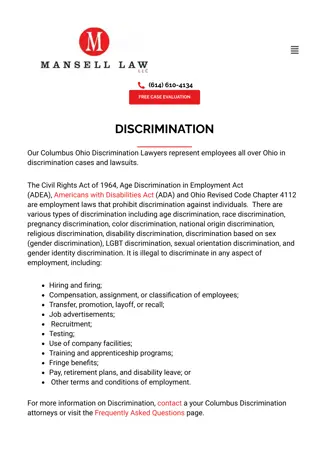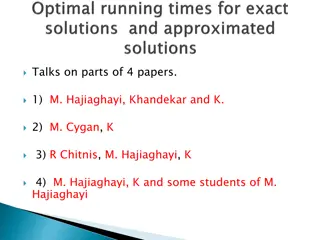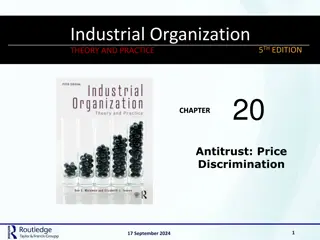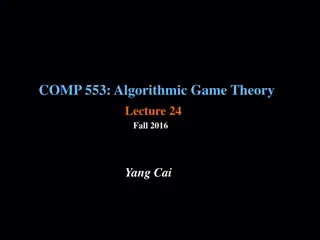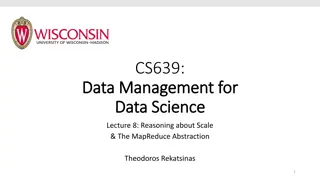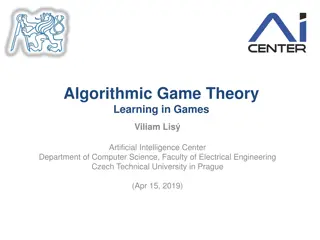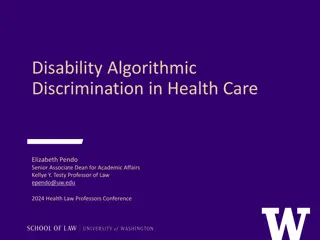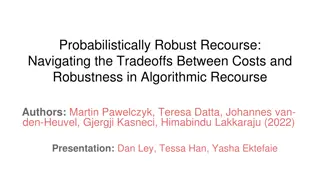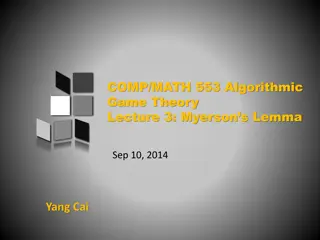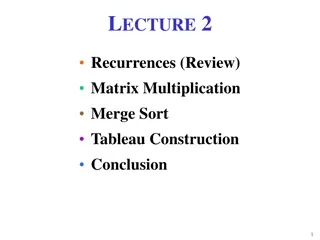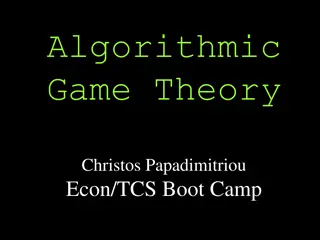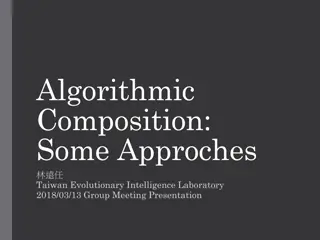Understanding Algorithmic Thinking: Key Concepts and Importance
Algorithmic thinking is a crucial skill that involves problem-solving through precisely defined instructions. This competency, applicable beyond computing, entails analyzing problems, identifying steps to solve them, and designing efficient algorithms. The importance of algorithmic thinking lies in
1 views • 13 slides
International Human Rights Treaties and Recommendations for Combatting Racism
Mila Paspalanova, the Anti-Racial Discrimination Advisor for Europe at OHCHR, discusses core treaties related to racial discrimination, international conventions, and efforts to combat discrimination based on religion or belief. The content highlights the importance of ICERD, ICCPR, and other key tr
6 views • 16 slides
Employment Discrimination Lawyer Columbus Ohio | Discrimination
Facing workplace discrimination in Columbus, Ohio? Get legal help! Employment Discrimination Lawyer Columbus Ohio. We fight for your rights.\n
0 views • 4 slides
Employment Discrimination Lawyer Columbus Ohio | Discrimination
Facing workplace discrimination in Columbus, Ohio? Get legal help! Employment Discrimination Lawyer Columbus Ohio. We fight for your rights.\n
0 views • 4 slides
Understanding Discrimination and Sexual Harassment Policy in AMVETS
This content provides insights into the policy and definitions of discrimination, sexual harassment, and examples within the context of AMVETS organization. It explains the prohibited behaviors, such as gender-based harassment, and outlines the scope of the policy in addressing discrimination based
1 views • 19 slides
HotFuzz: Discovering Algorithmic Denial-of-Service Vulnerabilities
A detailed exploration of algorithmic complexity bugs and insight into distributed micro-fuzzing methods. The study uncovers vulnerabilities through guided micro-fuzzing approaches, emphasizing the importance of AC bug detection and fuzz testing techniques such as seed inputs, fuzz observations, and
0 views • 14 slides
Understanding the Right to an Explanation in GDPR and AI Decision Making
The paper delves into the necessity for Explainable AI driven by regulations such as the GDPR, which mandates explanations for algorithmic decisions. It discusses the debate surrounding the existence of a legally binding right to explanation and the complexities of accommodating algorithmic machines
0 views • 22 slides
Equality Act 2017: Ensuring Equal Access and Protection from Discrimination
The Equality Act 2017 aims to harmonise and extend statutory protection from discrimination for a wider range of people in various areas such as employment, goods and services, education, public functions, premises, and associations. It identifies nine protected characteristics including race, sex,
3 views • 39 slides
Understanding Discrimination on the Basis of Disability
Manifestation of discrimination based on disability, forms of discrimination, reasonable accommodation, responsibility for combatting discrimination, and the importance of non-discrimination and equality in ensuring human rights and freedoms for persons with disabilities are explored within this mod
1 views • 18 slides
The Work of ACERWC on Racism, Discrimination, and Children's Rights
The African Committee of Experts on the Rights and Welfare of the Child (ACERWC) focuses on issues such as racism, ethnic and religious discrimination, and children's rights. Established in 1990 and ratified by 49 countries, ACERWC ensures non-discrimination, child survival, participation, and devel
0 views • 12 slides
Gender-based Discrimination in Kosovo: Research Findings and Analysis
Research conducted in Kosovo evaluates gender-based discrimination awareness and implementation of legal responsibilities. The study assesses the legal framework, reported cases, public awareness, and institutional response to discrimination. Methodologies included legal analysis, surveys, interview
0 views • 50 slides
Understanding Disability Discrimination Laws in Education
Comprehensive overview of Disability Discrimination Act 1992 (Cth), Disability Standards for Education 2005 (Cth), and the legal framework prohibiting discrimination against students with disabilities. Exploring direct and indirect discrimination, limitations of the DDA, and examples of less favorab
3 views • 40 slides
Evolution of Algorithms and Computer Science Through History
The history of algorithms and algorithmic thinking dates back to ancient times, with the development of general-purpose computational machines by Charles Babbage in the 19th century marking a significant advancement. The term "computer science" emerged in 1959, encompassing theoretical computer scie
1 views • 39 slides
Computational Thinking, Algorithms & Programming Overview
This unit covers key concepts in computational thinking, including decomposition, abstraction, and algorithmic thinking. Decomposition involves breaking down complex problems, abstraction focuses on identifying essential elements, and algorithmic thinking is about defining clear instructions to solv
1 views • 5 slides
Understanding Algorithmic Thinking in Digital Systems
Explore the application of algorithmic thinking in digital systems through the journey of Mike Clapper, the Executive Director of AMT. Learn about recognizing patterns in data, creating algorithms to solve problems, and utilizing information systems creatively. Enhance your knowledge of digital syst
0 views • 56 slides
Insights into Advanced Algorithmic Problems
Delve into discussions surrounding complex algorithmic challenges, such as the limitations in solving the 3-SAT problem within specific time bounds, the Exponential Time Hypothesis, proving lower bounds for algorithms in various scenarios, and exploring approximation ratios in algorithm design. Thes
1 views • 65 slides
Sketching as a Tool for Algorithmic Design by Alex Andoni - Overview
Utilizing sketching in algorithmic design, Alex Andoni from Columbia University explores methodologies such as succinct efficient algorithms, dimension reduction, sampling, metric embeddings, and more. The approach involves numerical linear algebra, similarity search, and geometric min-cost matching
0 views • 18 slides
Preventing Pregnancy-Related Discrimination in Access and Opportunities
This content discusses the importance of preventing pregnancy-related discrimination in access and opportunities, covering relevant laws such as Title IX of the Education Amendments Act of 1972 and Title VII of the Civil Rights Act of 1964. It provides examples of pregnancy discrimination, ways to p
0 views • 20 slides
Workplace Discrimination Policies and Procedures at Texas A&M University-Kingsville
Texas A&M University-Kingsville strictly prohibits discrimination based on various factors such as race, color, sex, religion, national origin, disability, and more. Employees are expected to maintain discrimination-free environments and report any discriminatory actions observed or brought to their
0 views • 11 slides
Antitrust and Price Discrimination: Robinson-Patman Act Overview
The Robinson-Patman Act, a significant antitrust statute, aims to prevent price discrimination that harms competition, particularly targeting sellers granting discriminatory prices. While some price discrimination can enhance efficiency, predatory discrimination poses a serious threat to competition
0 views • 30 slides
Algorithmic Issues in Tracking: A Deep Dive into Mean Shift, EM, and Line Fitting
Delve into algorithmic challenges in tracking tasks, exploring techniques like mean shift, Expectation-Maximization (EM), and line fitting. Understand the complexities of differentiating outliers and inliers, with a focus on segregating points into best-fit line segments.
0 views • 44 slides
Understanding Greedy Algorithms in Algorithmic Design
Greedy algorithms in algorithmic design involve making the best choice at each step to tackle large, complex problems by breaking them into smaller sub-problems. While they provide efficient solutions for some problems, they may not always work, especially in scenarios like navigating one-way street
1 views • 9 slides
Enhancing Algorithmic Team Formation Through Stakeholder Engagement
Integrating stakeholder voices is crucial in algorithmic team formation to ensure a positive team experience, quality outcomes, and high performance. This research explores learner-centered approaches and considers various team formation methods, highlighting their strengths and weaknesses in educat
0 views • 37 slides
Understanding Brouwer's Fixed Point Theorem and Nash's Proof in Algorithmic Game Theory
Explore the foundational theorems of Brouwer and Nash in Algorithmic Game Theory. Dive into Brouwer's Fixed Point Theorem, showcasing the existence of fixed points in continuous functions. Delve into Nash's Proof, unveiling the Nash equilibrium in game theory. Discover visualizations and constructio
0 views • 23 slides
Training Guidelines and Methodology for Fighting Discrimination
The training module focuses on combating racism, xenophobia, and discrimination through practical exercises and theoretical frameworks. It includes sessions on understanding discrimination, EU frameworks, good practices, and ways to fight against various forms of discrimination. The methodology inco
0 views • 19 slides
Understanding Scalability and Algorithmic Complexity in Data Management for Data Science
This lecture delves into the concept of scalability in data management for data science, covering operational and algorithmic aspects. It discusses the importance of efficient resource utilization, scaling out to multiple computing nodes, and managing algorithmic complexity for optimal performance i
0 views • 47 slides
Proposal for Directive to Enhance Working Conditions in Platform Work
The proposal aims to address challenges in platform work, including employment status classification and algorithmic management issues. It seeks to improve transparency, fairness, and accountability in algorithmic decision-making, correctly determine employment status, enhance transparency in platfo
0 views • 13 slides
Understanding Debugging in High-Level Languages
Debugging in high-level languages involves examining and setting values in memory, executing portions of the program, and stopping execution as needed. Different types of errors – syntactic, semantic, and algorithmic – require specific debugging approaches. Syntactic errors are related to code l
0 views • 9 slides
Algorithmic Game Theory Learning in Games by Viliam Lis
The content discusses the concept of algorithmic game theory learning in games, covering topics such as online learning, prediction, best response dynamics, and convergence to Nash equilibrium. It explores how simple learning agents achieve equilibrium outcomes and the application of algorithms in v
0 views • 23 slides
Algorithmic Discrimination in Health Care: Protecting Vulnerable Patients
Elizabeth Pendo and Jennifer D. Oliva discuss disability discrimination in health care algorithms, advocating for legal protections under Section 504, ADA, and ACA. Their article proposes strategies to combat algorithmic bias and enhance antidiscrimination efforts in the 2024 Section 1557 final rule
0 views • 13 slides
Addressing Misconduct and Discrimination at the Swedish Defence University
The Swedish Defence University upholds a zero-tolerance policy against harassment, bullying, and discrimination, actively enforcing laws like the Swedish Discrimination Act. In addition to prohibiting various forms of discrimination, the university is establishing clear rules of order and a code of
0 views • 7 slides
Navigating Tradeoffs in Algorithmic Recourse: A Probabilistic Approach
This paper introduces PROBE, a Probabilistically Robust Recourse framework allowing users to balance cost and robustness in algorithmic recourse. Users can choose the recourse invalidation rate, enabling more tailored and efficient recourse management compared to existing methods. PROBE enhances cos
0 views • 17 slides
Understanding Myerson's Lemma in Algorithmic Game Theory
Myerson's Lemma is a fundamental concept in algorithmic game theory, particularly in the context of Sponsored Search Auctions. This lecture delves into the application of Myerson's Lemma to ensure truthful bidding as a dominant strategy, maximize social welfare, and maintain polynomial running time
0 views • 19 slides
Understanding Algorithmic Complexity Measures and the Master Method
In this study, we explore key concepts in algorithmic complexity, including recurrences, matrix multiplication, merge sort, and tableau construction. We delve into the Master Method for solving recurrences, examining Cases 1, 2, and 3, and providing solutions for each scenario. Additionally, we disc
0 views • 61 slides
Algorithmic Game Theory Lecture on Prophet Inequality and Auction Design
In this lecture on Algorithmic Game Theory, Mingfei Zhao discusses the Prophet Inequality and its application to single-item auctions. The lecture covers the concept of Prophet Inequality, strategies to guarantee expected payoffs, and different auction designs such as the Bulow-Klemperer Theorem and
0 views • 10 slides
Evolution of Algorithmic Game Theory in Computer Science
The evolution of Algorithmic Game Theory (AGT) in the realm of Computer Science showcases the intersection of economics and theoretical computation. Before 1995, notable researchers like von Neumann and Megiddo laid the foundation for AGT. Concepts such as computation as a game, bounded rationality,
0 views • 62 slides
Exploring Algorithmic Composition Techniques in Music Generation
Algorithmic composition involves the use of algorithms to create music, mimicking human composers by generating music based on specific rules and structures. This presentation delves into various approaches such as DeepBach, MuseGAN, and EMI, highlighting the use of evolutionary algorithms, machine
0 views • 35 slides
Understanding Price Discrimination in Monopoly Markets
Price discrimination under monopoly occurs when businesses charge different prices to different consumer groups for the same product or service. Conditions for price discrimination include monopoly power, market segmentation, ability to separate consumer groups, and prevention of resale. Examples of
0 views • 12 slides
Understanding Racism, Racial Discrimination, and Xenophobia in the Context of an Anti-Racist Church Advocating for Justice
Racism, racial discrimination, and xenophobia are real issues that impact lives based on color, ethnicity, and cultural background. The International Convention for the Elimination of Racial Discrimination defines racism as promoting racial hatred and discrimination. The World Council of Churches (W
0 views • 9 slides
Understanding the Impact of Discrimination on Health
Exploring the negative effects of discrimination on physical and mental health, this content delves into how experiencing discrimination can lead to illnesses, unhealthy habits, and additional health risks. The concept of positive discrimination to aid discriminated groups is also discussed, highlig
0 views • 20 slides
